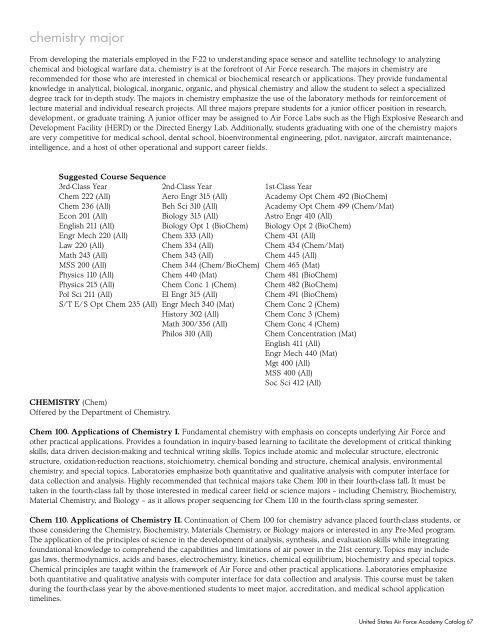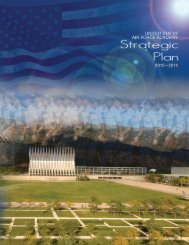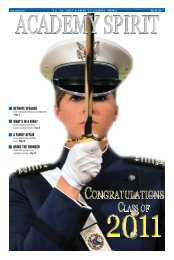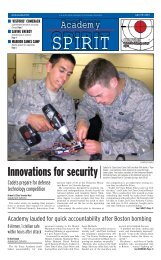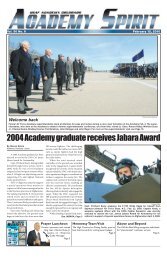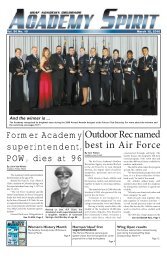2008-2009 Catalog - United States Air Force Academy
2008-2009 Catalog - United States Air Force Academy
2008-2009 Catalog - United States Air Force Academy
You also want an ePaper? Increase the reach of your titles
YUMPU automatically turns print PDFs into web optimized ePapers that Google loves.
chemistry major<br />
From developing the materials employed in the F-22 to understanding space sensor and satellite technology to analyzing<br />
chemical and biological warfare data, chemistry is at the forefront of <strong>Air</strong> <strong>Force</strong> research. The majors in chemistry are<br />
recommended for those who are interested in chemical or biochemical research or applications. They provide fundamental<br />
knowledge in analytical, biological, inorganic, organic, and physical chemistry and allow the student to select a specialized<br />
degree track for in-depth study. The majors in chemistry emphasize the use of the laboratory methods for reinforcement of<br />
lecture material and individual research projects. All three majors prepare students for a junior officer position in research,<br />
development, or graduate training. A junior officer may be assigned to <strong>Air</strong> <strong>Force</strong> Labs such as the High Explosive Research and<br />
Development Facility (HERD) or the Directed Energy Lab. Additionally, students graduating with one of the chemistry majors<br />
are very competitive for medical school, dental school, bioenvironmental engineering, pilot, navigator, aircraft maintenance,<br />
intelligence, and a host of other operational and support career fields.<br />
Suggested Course Sequence<br />
3rd-Class Year 2nd-Class Year 1st-Class Year<br />
Chem 222 (All) Aero Engr 315 (All) <strong>Academy</strong> Opt Chem 492 (BioChem)<br />
Chem 236 (All) Beh Sci 310 (All) <strong>Academy</strong> Opt Chem 499 (Chem/Mat)<br />
Econ 201 (All) Biology 315 (All) Astro Engr 410 (All)<br />
English 211 (All) Biology Opt 1 (BioChem) Biology Opt 2 (BioChem)<br />
Engr Mech 220 (All) Chem 333 (All) Chem 431 (All)<br />
Law 220 (All) Chem 334 (All) Chem 434 (Chem/Mat)<br />
Math 243 (All) Chem 343 (All) Chem 445 (All)<br />
MSS 200 (All)<br />
Chem 344 (Chem/BioChem) Chem 465 (Mat)<br />
Physics 110 (All) Chem 440 (Mat) Chem 481 (BioChem)<br />
Physics 215 (All) Chem Conc 1 (Chem) Chem 482 (BioChem)<br />
Pol Sci 211 (All) El Engr 315 (All) Chem 491 (BioChem)<br />
S/T E/S Opt Chem 235 (All) Engr Mech 340 (Mat) Chem Conc 2 (Chem)<br />
History 302 (All)<br />
Chem Conc 3 (Chem)<br />
Chemistry (Chem)<br />
Offered by the Department of Chemistry.<br />
Math 300/356 (All)<br />
Philos 310 (All)<br />
Chem Conc 4 (Chem)<br />
Chem Concentration (Mat)<br />
English 411 (All)<br />
Engr Mech 440 (Mat)<br />
Mgt 400 (All)<br />
MSS 400 (All)<br />
Soc Sci 412 (All)<br />
Chem 100. Applications of Chemistry I. Fundamental chemistry with emphasis on concepts underlying <strong>Air</strong> <strong>Force</strong> and<br />
other practical applications. Provides a foundation in inquiry-based learning to facilitate the development of critical thinking<br />
skills, data driven decision-making and technical writing skills. Topics include atomic and molecular structure, electronic<br />
structure, oxidation-reduction reactions, stoichiometry, chemical bonding and structure, chemical analysis, environmental<br />
chemistry, and special topics. Laboratories emphasize both quantitative and qualitative analysis with computer interface for<br />
data collection and analysis. Highly recommended that technical majors take Chem 100 in their fourth-class fall. It must be<br />
taken in the fourth-class fall by those interested in medical career field or science majors -- including Chemistry, Biochemistry,<br />
Material Chemistry, and Biology – as it allows proper sequencing for Chem 110 in the fourth-class spring semester.<br />
Chem 110. Applications of Chemistry II. Continuation of Chem 100 for chemistry advance placed fourth-class students, or<br />
those considering the Chemistry, Biochemistry, Materials Chemistry, or Biology majors or interested in any Pre-Med program.<br />
The application of the principles of science in the development of analysis, synthesis, and evaluation skills while integrating<br />
foundational knowledge to comprehend the capabilities and limitations of air power in the 21st century. Topics may include<br />
gas laws, thermodynamics, acids and bases, electrochemistry, kinetics, chemical equilibrium, biochemistry and special topics.<br />
Chemical principles are taught within the framework of <strong>Air</strong> <strong>Force</strong> and other practical applications. Laboratories emphasize<br />
both quantitative and qualitative analysis with computer interface for data collection and analysis. This course must be taken<br />
during the fourth-class year by the above-mentioned students to meet major, accreditation, and medical school application<br />
timelines.<br />
<strong>United</strong> <strong>States</strong> <strong>Air</strong> <strong>Force</strong> <strong>Academy</strong> <strong>Catalog</strong> 67


